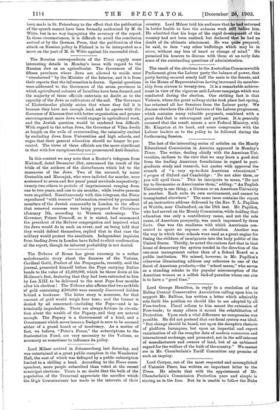The last of the interesting series of articles on the
Mosely Educational Commission in America appeared in Monday's Times. The writer, dealing chiefly with the American Uni- versities, inclines to the view that we may learn a good deal from the leading American foundations in regard to por•t- graduate study and research, but quotes with approval the remark of "a very up-to-date American educationist" a propos of Oxford and Cambridge : " Do not alter them, or you will spoil them." This he interprets to mean, "Do not try to Germanise or Americanise thein," adding: " An English University is one thing ; a German or an American University is another. Each suits its own environment, and cannot be transplanted elsewhere." The same issue contains the report of an instructive address delivered by the Rev. T. L. Papillon at Writtle, near Chelmsford, on the 18th inst. Mr. Papillon, who had served on the Mosely Commission, while holding that education was . only a contributory cause, and not the sole cause, of American prosperity, was much impressed by three facts. One was the readiness with which Americans con- sented to spare no expense on education. Another was the way in which their schools were used as a great engine for fusing the children of immigrants into the body politic of the United States. Thirdly, he noted the curious fact that in that home of democracy the system tended in the direction of the one-man management rather than of a School Board as a public institution. We missed, however, in Mr. Papillon's otherwise illuminating address any reference to one of the finest of American products,—the " school marm," who serves as a standing rebuke to the popular misconception of the American woman as a selfish bird-of-paradise whose one aim is to have a " good time."






































 Previous page
Previous page